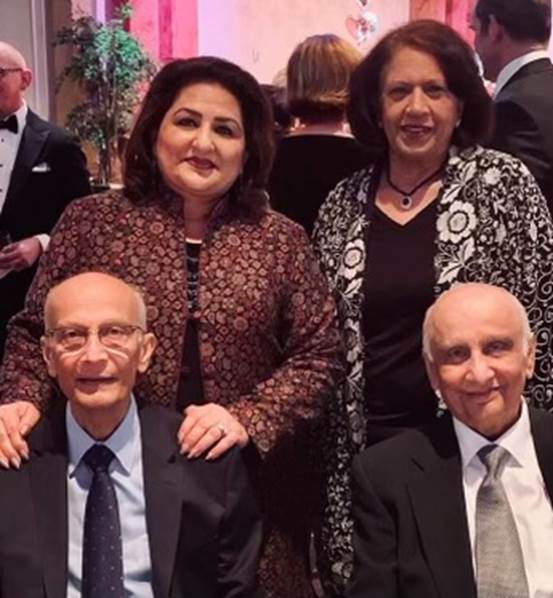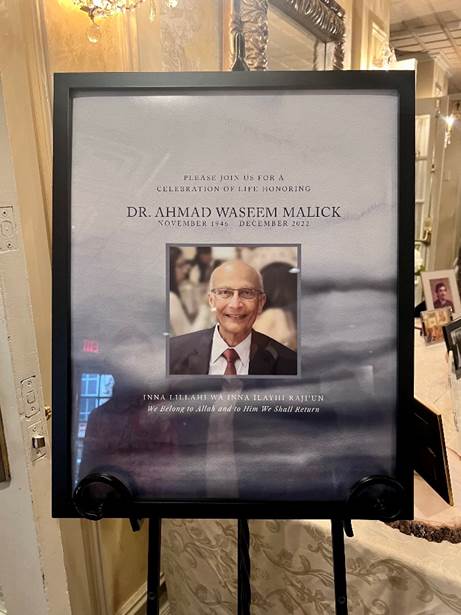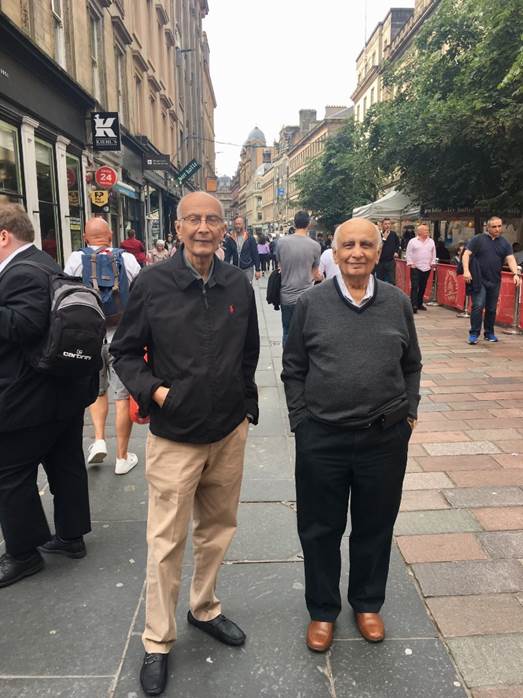
Dr Ahmad Waseem Mallick (left) and brother Ahmed Nadeem with their wives
Remembering a Great Pakistani American Scientist
By C. Naseer Ahmad

Dr Waseem A. Mallick, who spent over 30 years working for Swiss Pharmaceutical giant Hoffman-La Roche, was a mensch and an angel of mercy. He passed away in December 2022 in New Jersey. On February 5 th, about 150 of his friends, colleagues and family members gathered to remember him.
Mensch is “someone to admire and emulate, someone of noble character,” according to the American humorist Leo Rosten. This is exactly how many of Dr Mallick’s friends and family members remember him not only as a scientist par excellence but a truly generous spirit who inspired his colleagues to excel.
Dr Mallick’s older brother, Ahmed Nadeem, said the following about him: “What distinguished Waseem Malick from so many high achievers one has known was his modesty, charm and prim manners; the latter inherited largely from our father Malik M. Akram and Nusrat Akram, our mother, a reminder of a gentler age and times now almost forgotten.”

Service to humanity was ingrained in Dr Mallick from the moment of his birth. His father, Malik M. Akram was a public servant in the Punjab province, first in India and then in Pakistan after the partition of India in 1947. He was a distinguished officer in administering governmental functions in service of the people of the province at all levels, which included besides being an administrator a magistrate too in performing judicial duties.

The two brothers stand together with Ahmad Waseem Mallick on the left and Ahmed Nadeem on the right
His mother, Nusrat Akram was a tireless soul in performing voluntary service for the betterment of the poor and deprived. She was encouraged by her husband to become part of such undertakings. She got actively involved in improving the life of those that were handicapped in any way and led an effort of establishing a center for rehabilitation of the disabled in Lahore, Pakistan. She approached Dr Howard Rusk, a pioneer in the rehabilitation of the physically disabled in the US and many other countries, also the President World Rehabilitation Fund at the time, resulting in obtaining international support for the center in Pakistan.
Angel of Mercy is an affectionate term associated with nurses caring for sick patients. Nurses and doctors are often considered angels for the care and medicines administered to those afflicted by diseases. The unseen and seldom noticed angels of mercy in this context are scientists like Dr Mallick whose painstaking work result in medicines administered by doctors and nurses around the world.
Along with his colleagues, Dr Mallick developed a number of medicines which played a critical role in fighting disease and in some cases extending life. Among such medicines is Zelboraf which received the Prix Galien Award in 2013 for best medicine. According to a Reuters report in June 2011, this medicine improved the survival rate by 63% in patients with advanced melanoma.
In fact, the Reuters report mentioned Dr Paul Chapman of Memorial Sloan-Kettering Cancer Center in New York as the study’s lead investigator who called the results an “unprecedented level of difference” for patients with advanced melanoma, who typically survive just eight months on current treatments.
It is natural for family members to have affection for the loved ones and miss dearly someone who is no longer with them. In modern life, professional relationships become an extension of familial bonds. Not only affectionate bonds are extended but also the loss of someone gets shared – sometimes just as much as with one’s own family. So, in this context, it is relevant to share how Dr Mallick’s friends and colleagues remembered him:
“It is with a heavy heart that we share the news of the passing of Dr Waseem Mallick. Waseem was a dear friend, a cherished mentor, and an esteemed colleague. Over the dedicated service of 32 years at Hoffmann-La Roche as Senior Vice President of Pharmaceutical and Analytical Research and Development (PARD), he touched the lives of many people with his kindness, thoughtfulness, and caring nature both directly and indirectly. While leading a major global function for a big pharmaceutical company, he seamlessly bridged the two continents covering Switzerland to California while passing through New York/New Jersey. With his leadership ability he helped create one of the best research groups in the industry that helped develop many complex and innovative technologies to bring the novel drugs to patients in need. The news of his passing was felt all over the globe but more profoundly by his research teams with whom he stayed in touch even after his retirement.”
During his tenure at Roche, he created and led a world-class global R&D team recognized for innovative drug products. His team successfully developed, registered, and supported the launch of several innovative medicines. He and his team led technical development from the discovery phase (Clinical Lead Optimization) to late stage (NDA). The success of these products is a true testament of Dr Mallick’s passion for science and care for scientists. He was instrumental in not only recruiting the best talent in the industry but also bringing them together to work as a team, providing them the supportive environment and pushing the boundary ever so gently by inspiring them and infusing confidence and optimism while remaining vigilant about the nature of science. His unique mix of science, kindness, and leadership made him an effective leader who was respected across the globe. With over 150 publications, numerous presentations, patents, and a book he helped advance the field of Pharmaceutics to new heights. In recognition of his professional excellence and sustained contributions to pharmaceutical science, he was an invited speaker at major scientific meetings. His contributions were recognized by numerous awards that he received including the Fellow by American Association of Pharmaceutical Scientist, American Association of Indian Pharmaceutical Scientists.
Dr Mallick was recognized for his exceptional management and leading scientific personnel in multiple global centers, strategic planning, multimillion dollar investments, operating and capital budgets. During his tenure at Roche, he was leading the global formulation function with teams in Switzerland, America, Germany, China, and Japan. In addition, he served on technical committees with review and oversight responsibilities of all internal as well as licensed-in projects ensuring technical success. Dr Mallick also served on Board of Directors of non-profit organizations, Scientific Advisory Board of universities, non-profit organizations and held academic appointments. Most notably, he served on the Research & Development Council of New Jersey, a nonprofit organization which advocates for progress in various research and development sectors in the state of New Jersey. Dr Mallick was also a great advocate for STEM education and served as advisor and speaker to a number of organizations.
He supported the development of science and scientists across the globe. He treated each colleague with utmost dignity and respect. He was always there to celebrate and cherish the successes and support and encourage when something didn’t go right. Several of his colleagues across the globe shared their personal memories during a special Memorial Service held in his honor by his friends and family. Some of the quotes from the Memorial Service transcribed below show how he touched the lives of many colleagues in his professional life.
Dr Navnit Shah, Group Head Formulation Development, Nutley, NJ, said that working under his leadership for the last 32 years was a lot of excitement and fun. He brought all the scientists together in developing complex differentiated products to save many lives. Fond memories of our time at Roche will stay with us forever. He was a pharmaceutical giant and his legacy will stay forever.
“We believe his legacy will continue for many generations in the form of products that improved the lives of many patients and their families worldwide, and the science he developed will lead the way for future scientists.”
Scientists like Dr Mallick study pharmacology to embark on a path to use scientific methods to develop medicines that bring relief from disease for fellow human beings. Chemistry plays an important role and Theodore William Richards, who was the first American scientist to win the Nobel Prize in Chemistry, wrote in the Atlantic in 1909: “The particular branch of science called chemistry … holds the key which alone can unlock the gate to really fundamental knowledge of the hidden causes of health and disease.”
An understanding of chemical bonds is required to advance in scientific research, whether in the laboratory or in the library.
Just as chemistry and chemical bonds are important for scientific discovery the chemistry between scientists as people is just as important for scientific research and development to succeed. So, the words with which his friends remember Dr Mallick are a testament of the chemistry in the work culture at Hoffman-La Roche. These precious words are exemplars of strong covalent bonds between scientists at the atomic level.

